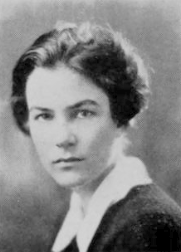Rosemary Thomas (February 16, 1901 – April 7, 1961) was an American poet and teacher, known for her book of poems Immediate Sun, which won the Twayne First Book Contest in 1951.
Rosemary Thomas | |
|---|---|
 In the Smith College yearbook, 1923 | |
| Born | February 16, 1901 |
| Died | April 7, 1961 (aged 60) New York, New York, US |
| Education | |
| Occupation(s) | Poet, teacher |
Education
editThomas graduated from Smith College in 1923. In 1950, she received a Master of Arts degree from Columbia University for an essay on Lawrence Durrell, the British poet and novelist.[1]
She taught creative writing at various schools including Spence School and Brearley School in New York, Shipley School in Bryn Mawr, Pennsylvania and Oxford School in Hartford, Connecticut.[1]
Literary career
editIn 1951, Thomas won the Twayne First Book Contest for her only book of poems, Immediate Sun.[2] The book had a foreword written by Archibald MacLeish, who described her poems as having "a common quality, a characteristic idiom, and inflection the reader would recognize again as a man recognizes the inflection of a decisive voice".[3] The book includes a poem about her brother-in-law, Canadian tennis star J.F. Foulkes, entitled "The Colonel".[4] Her poems were also published in the New York Times, The New Yorker, and in other magazines.[1][5]
The final years of her life, which she devoted entirely to her writing, were divided between her homes in Duxbury, Massachusetts, and New York City, where she died in 1961.[3][6]
Legacy
editA posthumous collection of her poems was published in 1968, titled Selected Poems of Rosemary Thomas, with a foreword by Mark van Doren. He wrote: "Rosemary Thomas's poems will last, as all things excellent do, for the simple reason that nothing like them exists elsewhere."[3]
In 2004, her poem "The Elephants Pass Carnegie Hall" was set to music by composer David Leisner in his piece A Timeless Procession. It was first performed in 2011 at Symphony Space in New York City.[7][8] The program for the performance records that Leisner discovered Thomas's poems by chance at a library book sale in the late 1980s. He describes her as a "lyrical, imaginative, spiritual-minded poet whose work simply begged me to set it to music".[9]
The English Language and Literature Department at Smith College awards the Rosemary Thomas Poetry Prize annually to the best poem or group of poems.[10]
References
edit- ^ a b c "Rosemary Thomas, Poet and Teacher". The New York Times. April 6, 1961. Retrieved October 7, 2020. (subscription required)
- ^ "Poetry Prize Awarded: Rosemary Thomas Wins Twayne First Book Contest". The New York Times. January 10, 1951. Retrieved October 7, 2020. (subscription required)
- ^ a b c Thomas, Rosemary (1968). Selected Poems of Rosemary Thomas. New York: Twayne Publishers.
- ^ Thomas, Rosemary (1951). Immediate Sun. New York: Twayne Publishers, Inc. p. 49.
- ^ "Search – Rosemary Thomas". New Yorker. Retrieved October 7, 2020.
- ^ Written at New York. "Rosemary Thomas, Poet, Teacher, 60". The Jersey Journal. Jersey City, New Jersey. April 10, 1961. p. 2. Retrieved September 22, 2024 – via Newspapers.com.
- ^ "Rosemary Thomas". Song of America. Retrieved October 7, 2020.
- ^ "Classical Music/Opera Listings for March 18–24". New York Times. March 17, 2011. Retrieved October 7, 2020.
- ^ "A Timeless Procession". Song of America. Retrieved October 7, 2020.
- ^ "Prizes & Awards". Smith College. Archived from the original on October 5, 2020. Retrieved October 7, 2020.
External links
edit- Selected Poems of Rosemary Thomas at Google Books
- Rosemary Thomas papers, 1930–1966 at Columbia University Libraries
- Search results for Rosemary Thomas, poems published in the New Yorker between 1954 and 1961